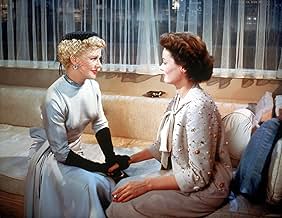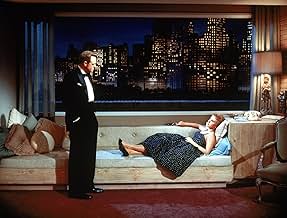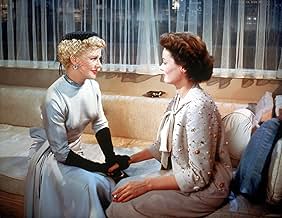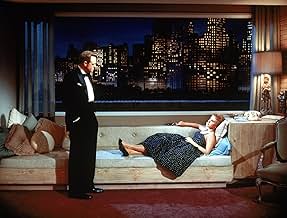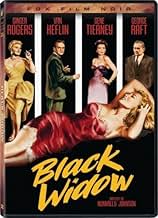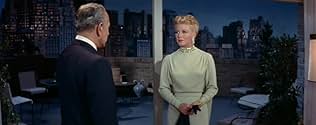VALUTAZIONE IMDb
6,7/10
3476
LA TUA VALUTAZIONE
Aggiungi una trama nella tua linguaAn aspiring young writer insinuates herself into the life of a Broadway producer only to meet an unexpected fate.An aspiring young writer insinuates herself into the life of a Broadway producer only to meet an unexpected fate.An aspiring young writer insinuates herself into the life of a Broadway producer only to meet an unexpected fate.
- Regia
- Sceneggiatura
- Star
Mabel Albertson
- Sylvia
- (non citato nei titoli originali)
Edward Astran
- Party Guest
- (non citato nei titoli originali)
Bea Benaderet
- Mrs. Franklin Walsh
- (non citato nei titoli originali)
Mary Benoit
- Party Guest
- (non citato nei titoli originali)
Nesdon Booth
- Police A.P.B. Man
- (non citato nei titoli originali)
Paul Bradley
- Party Guest
- (non citato nei titoli originali)
Steve Carruthers
- Party Guest
- (non citato nei titoli originali)
Recensioni in evidenza
Five years earlier, this drawingroom drama would have been filmed in small screen b&w. But the year is 1954 and film audiences are staying home with their new-fangled little black boxes. So a big budget studio like TCF takes what amounts to an "Ellery Queen in Manhattan" plot, gussies it up in lavish color, stretches the screen to Cinemascope length, loads up the marquee with big names, and sends the result out to compete with Lucille Ball and Milton Berle. I don't know how well the strategy succeeded commercially, but I enjoyed the movie then and still do.
As a whodunit, the mystery's only partially successful—not enough suspects and too convoluted to follow. At the same time, the pacing sometimes sags in ways that undercut the suspense. Still, the 95 minutes does add up to a gorgeous tapestry, thanks to expert art direction, set decoration, and a well-upholstered cast. And who could hold together a sometimes-confusing storyline better than the always-reliable Van Heflin. Also, I expect urbane writer-director Nunnally Johnson fit comfortably with the sophisticated Manhattan setting and show-biz personalities. So, it's not surprising that he gets off some insider innuendo. Catch the cocktail party shot at gossip columnist Hedda Hopper, known for her bizarre headgear; I expect Johnson was settling an old score there. Then too, having the ingénue (Garner) turn up mysteriously pregnant is rather daring for the straitjacketed Production Code period. Also, watch for the skinny young actor (Oliver) interviewed by Heflin near film's end. That's future TV mogul Aaron Spelling getting a proverbial foot in the door.
Anyway, the film provides an entertaining glimpse of drawingroom drama getting a face-lift during the early years of the television challenge.
As a whodunit, the mystery's only partially successful—not enough suspects and too convoluted to follow. At the same time, the pacing sometimes sags in ways that undercut the suspense. Still, the 95 minutes does add up to a gorgeous tapestry, thanks to expert art direction, set decoration, and a well-upholstered cast. And who could hold together a sometimes-confusing storyline better than the always-reliable Van Heflin. Also, I expect urbane writer-director Nunnally Johnson fit comfortably with the sophisticated Manhattan setting and show-biz personalities. So, it's not surprising that he gets off some insider innuendo. Catch the cocktail party shot at gossip columnist Hedda Hopper, known for her bizarre headgear; I expect Johnson was settling an old score there. Then too, having the ingénue (Garner) turn up mysteriously pregnant is rather daring for the straitjacketed Production Code period. Also, watch for the skinny young actor (Oliver) interviewed by Heflin near film's end. That's future TV mogul Aaron Spelling getting a proverbial foot in the door.
Anyway, the film provides an entertaining glimpse of drawingroom drama getting a face-lift during the early years of the television challenge.
Van Heflin is a theatrical producer who's suspected of murder in "Black Widow," a 1954 20th Century Fox Technicolor film directed by Nunnally Johnson. The film is set in New York among the sophisticated Broadway set, and the cast is full of familiar faces: Ginger Rogers, Gene Tierney, George Raft, Reginald Gardiner, Peggy Ann Garner, Virginia Leith, Otto Kruger, Mabel Albertson, and even Aaron Spelling.
Garner plays a young writer who, new to New York, keeps making increasingly important friends until she winds up an apparent suicide in the apartment of producer Peter Denver and his beautiful actress wife, Lottie. Soon, however, it's revealed that she was murdered, and Heflin is the prime suspect. During his own investigation as he tries to keep George Raft from putting him in prison, he learns that the sweet young thing may have been young, but she wasn't sweet.
Though a little slow at times, this is a highly entertaining film with its shots of New York and panoramic views from luxury apartments. The acting is wonderful. Ginger Rogers is great as the glamorous, acid-tongued Iris, a well-known actress with a ne'er do well husband, played effectively by Gardiner. Gene Tierney looks lovely but has a supporting role in this as Heflin's wife. The film sports two former child actors: Peggy Ann Garner as the murder victim and Skip Homeier as one of her love interests. Newcomer Virginia Leith is Homeier's sister and Garner's confidante. Garner looks appropriately innocent.
The looping in this film is very obvious for some reason - at least on television, some of the sound was fuzzy and then boom! the dubbing would come in. A very minor point. The mystery is intriguing, the glamor high, the dialogue sharp - an engrossing way to spend one's time.
Garner plays a young writer who, new to New York, keeps making increasingly important friends until she winds up an apparent suicide in the apartment of producer Peter Denver and his beautiful actress wife, Lottie. Soon, however, it's revealed that she was murdered, and Heflin is the prime suspect. During his own investigation as he tries to keep George Raft from putting him in prison, he learns that the sweet young thing may have been young, but she wasn't sweet.
Though a little slow at times, this is a highly entertaining film with its shots of New York and panoramic views from luxury apartments. The acting is wonderful. Ginger Rogers is great as the glamorous, acid-tongued Iris, a well-known actress with a ne'er do well husband, played effectively by Gardiner. Gene Tierney looks lovely but has a supporting role in this as Heflin's wife. The film sports two former child actors: Peggy Ann Garner as the murder victim and Skip Homeier as one of her love interests. Newcomer Virginia Leith is Homeier's sister and Garner's confidante. Garner looks appropriately innocent.
The looping in this film is very obvious for some reason - at least on television, some of the sound was fuzzy and then boom! the dubbing would come in. A very minor point. The mystery is intriguing, the glamor high, the dialogue sharp - an engrossing way to spend one's time.
No matter how pretentious the cocktail party, never escape by asking another wallflower out for dinner. That was theatrical producer Van Heflin's mistake when, on the terrace of Broadway diva Ginger Rogers' apartment, he took pity on hopeful young writer Peggy Ann Garner. Just a few months later, she was found hanged in the bathroom of his apartment.
It was all very innocent, though. While his wife, another star on the Rialto (Gene Tierney), was away tending to her ailing mother, Heflin let Garner use his place as a daytime office so she could write in quiet comfort. (Well, not so quiet: She listens to `The Dance of the Seven Veils' from Salome incessantly and fixates on a line from the opera: `The mystery of love is stronger than the mystery of death.') But when it turns out not only that she was pregnant but that she was murdered, the police sensibly enough find in Heflin their prime suspect.
Black Widow, written and directed by Nunnally Johnson, assembles an impressive array of Hollywood luminaries across whose resumés long shadows were beginning to creep. Along with Rogers, Tierney and Heflin, there's George Raft as a police detective, Otto Krueger as Garner's actor uncle and Reginald Gardiner as Rogers' whipped spouse. It's an ensemble-cast, 40s-high-style mystery movie, made about a decade too late but not too much the worse for that (even allowing for its color and Cinemascope).
Heflin's technically the center of the movie the patsy racing around to prove his innocence. But the meatier parts go to the women, except for Tierney, all but wasted in the recessive role of the elegant but dutiful wife. Garner makes her abrupt exit early in the movie, but returns in startlingly revisionist flashbacks. And, as the grande dame (named `Carlotta,' perhaps in homage to another grande dame of the stage, Marie Dressler's Carlotta Vance in Dinner at Eight?), Rogers strides around in big-ticket outfits and fakes a highfalutin drama-queen accent. For most of the movie it seems like ill-fitting role for the essentially proletarian Rogers, but it's shrewdly written, and near the end she shows her true colors, becoming, briefly, sensational.
Like Repeat Performance and All About Eve, Black Widow uncoils in a high-strung, back-stabbing theatrical milieu that's now all but vanished all the money and the glamour have moved west. (Not to put too fine a point on it, but the tiny part of a struggling Greenwich Village actor is taken by television producer Aaron Spelling, now one of the richest men in Hollywood.) The movie cheats a little by withholding information essential to our reading of the characters, but it's a forgivable feint; the characters are all `types' anyhow. There is, however, one baffling omission there's not a single widow in the plot.
It was all very innocent, though. While his wife, another star on the Rialto (Gene Tierney), was away tending to her ailing mother, Heflin let Garner use his place as a daytime office so she could write in quiet comfort. (Well, not so quiet: She listens to `The Dance of the Seven Veils' from Salome incessantly and fixates on a line from the opera: `The mystery of love is stronger than the mystery of death.') But when it turns out not only that she was pregnant but that she was murdered, the police sensibly enough find in Heflin their prime suspect.
Black Widow, written and directed by Nunnally Johnson, assembles an impressive array of Hollywood luminaries across whose resumés long shadows were beginning to creep. Along with Rogers, Tierney and Heflin, there's George Raft as a police detective, Otto Krueger as Garner's actor uncle and Reginald Gardiner as Rogers' whipped spouse. It's an ensemble-cast, 40s-high-style mystery movie, made about a decade too late but not too much the worse for that (even allowing for its color and Cinemascope).
Heflin's technically the center of the movie the patsy racing around to prove his innocence. But the meatier parts go to the women, except for Tierney, all but wasted in the recessive role of the elegant but dutiful wife. Garner makes her abrupt exit early in the movie, but returns in startlingly revisionist flashbacks. And, as the grande dame (named `Carlotta,' perhaps in homage to another grande dame of the stage, Marie Dressler's Carlotta Vance in Dinner at Eight?), Rogers strides around in big-ticket outfits and fakes a highfalutin drama-queen accent. For most of the movie it seems like ill-fitting role for the essentially proletarian Rogers, but it's shrewdly written, and near the end she shows her true colors, becoming, briefly, sensational.
Like Repeat Performance and All About Eve, Black Widow uncoils in a high-strung, back-stabbing theatrical milieu that's now all but vanished all the money and the glamour have moved west. (Not to put too fine a point on it, but the tiny part of a struggling Greenwich Village actor is taken by television producer Aaron Spelling, now one of the richest men in Hollywood.) The movie cheats a little by withholding information essential to our reading of the characters, but it's a forgivable feint; the characters are all `types' anyhow. There is, however, one baffling omission there's not a single widow in the plot.
Van Heflin gives a striking, forceful performance as a theatrical producer in New York City who befriends a lonely 20-year-old girl at a party; she's a would-be writer hoping for success, he takes a shine to her and offers a helping hand...but then she turns up dead! Curiously mistitled drama really doesn't involve "a predatory female". Peggy Ann Garner is intriguing as the youngster who, in flashbacks, is revealed to be scheming and ambitious, somewhat ruthless, but not a black widow. Gene Tierney has a thankless role as Heflin's wife (she looks grim throughout), but Ginger Rogers is fun as a colorful, gossiping actress. The film has some ridiculous passages, red herrings and side-plots (one involving another young woman who appears to be fabricating a wild story just to frame Heflin is never explored), and a slightly anti-climactic finish. The film looks good and has some funny/catty lines in the beginning, but in the end it all seems a bit silly. **1/2 from ****
Black Widow (1954)
An early full color Cinemascope drama, loaded with starts, and written by a high powered but somewhat forgotten stage and screen writer of the 40s and 50s, Nunnally Johnson. And this is one of a handful of films he directed, too. It's really quite a fully blossomed drama, and it grows with complexity as it goes. And it's packed with stars. The leading man has always impressed me even though he's not the handsome or powerful sort that usually commands the first credits, Van Heflin. he's really amazing, subtle and perfectly sophisticated and well meaning and (eventually) tortured.
His wife is played with usual cool cheerfulness by Gene Tierney, and their neighbor and friend is a haughty and ridiculous (perfectly so) Ginger Rogers. Rogers takes her role to the hilt, both in arrogance and frivolity and later in emotional breakdown.
What ensues is not just highbrow Broadway theater culture, but eventually a criminal (or psychologically suspenseful) tidal wave sweeps over the relatively lightweight beginnings, and the effect is kind of remarkable in its own way. I mean, it's so completely theatrical and melodramatic, and yet it really works as an interpersonal and heartfelt (and probing) drama, too. The writing is smart, nuanced, and it plays the line of being exactly what it is--meaning that it's about the very world that Johnson lives in.
The cop in this case is George Raft, always a little stiff and stiff again here, but he does his job. The seductress who is the center of all these talents is Peggy Ann Garner. Who is she? Well, after several years of being a successful child actress, and except for a small role in an obscure 1951 Fred Zinnemann film as an adult, Garner was a television actress (including some t.v. movies) bouncing from one series to another. Then, at the end of her career, she had small roles in three more features. And in many ways, she's the weak link here--she's supposed to be sleeping her way to success in the theater world, and yet there's something not quite right about her in this role. I suppose I underestimate middle aged rich men.
The plot this girl weaves for those around her is elaborate and devilish. And when it goes wrong for her, it really goes wrong for our main man Heflin. At the point the film is very much like Hitchcock film, with the apparently innocent man accused of a crime. Unlike Hitchcock, Johnson uses flashbacks at key points near the end., which do their job but also have a way of deflating the suspense.
See for yourself!
An early full color Cinemascope drama, loaded with starts, and written by a high powered but somewhat forgotten stage and screen writer of the 40s and 50s, Nunnally Johnson. And this is one of a handful of films he directed, too. It's really quite a fully blossomed drama, and it grows with complexity as it goes. And it's packed with stars. The leading man has always impressed me even though he's not the handsome or powerful sort that usually commands the first credits, Van Heflin. he's really amazing, subtle and perfectly sophisticated and well meaning and (eventually) tortured.
His wife is played with usual cool cheerfulness by Gene Tierney, and their neighbor and friend is a haughty and ridiculous (perfectly so) Ginger Rogers. Rogers takes her role to the hilt, both in arrogance and frivolity and later in emotional breakdown.
What ensues is not just highbrow Broadway theater culture, but eventually a criminal (or psychologically suspenseful) tidal wave sweeps over the relatively lightweight beginnings, and the effect is kind of remarkable in its own way. I mean, it's so completely theatrical and melodramatic, and yet it really works as an interpersonal and heartfelt (and probing) drama, too. The writing is smart, nuanced, and it plays the line of being exactly what it is--meaning that it's about the very world that Johnson lives in.
The cop in this case is George Raft, always a little stiff and stiff again here, but he does his job. The seductress who is the center of all these talents is Peggy Ann Garner. Who is she? Well, after several years of being a successful child actress, and except for a small role in an obscure 1951 Fred Zinnemann film as an adult, Garner was a television actress (including some t.v. movies) bouncing from one series to another. Then, at the end of her career, she had small roles in three more features. And in many ways, she's the weak link here--she's supposed to be sleeping her way to success in the theater world, and yet there's something not quite right about her in this role. I suppose I underestimate middle aged rich men.
The plot this girl weaves for those around her is elaborate and devilish. And when it goes wrong for her, it really goes wrong for our main man Heflin. At the point the film is very much like Hitchcock film, with the apparently innocent man accused of a crime. Unlike Hitchcock, Johnson uses flashbacks at key points near the end., which do their job but also have a way of deflating the suspense.
See for yourself!
Lo sapevi?
- QuizNunnally Johnson originally offered the role played by Ginger Rogers to Tallulah Bankhead, who called the writer-producer and, in a 25-minute phone conversation, gave him her reasons for rejecting the role. Rogers turned the part down as well, but had a change of heart after Johnson sent her a letter asking her to reconsider, on the proviso that she could take the relatively minor role and make it into a star-turn.
- BlooperWhen the suicide note is discovered by the Denvers, it is lying, uncreased, on the table. Later, during questioning, the detective produces it, folded up, from his pocket. A cop would never mishandle and mutilate evidence that way.
- Citazioni
[opening narration]
Peter Denver: The Black Widow, deadliest of all spiders, earned its dark title through its deplorable practice of devouring its mate.
- Curiosità sui creditiOpening credits are shown over the background of a spider web made by a black widow.
- ConnessioniFeatured in Ginger Rogers at Twentieth Century Fox (2007)
- Colonne sonoreTheme from 'Dance of the Seven Veils'
from "Salome"
by Richard Strauss
[Played occasionally throughout the picture]
I più visti
Accedi per valutare e creare un elenco di titoli salvati per ottenere consigli personalizzati
- How long is Black Widow?Powered by Alexa
Dettagli
- Data di uscita
- Paese di origine
- Lingua
- Celebre anche come
- L'agente sconosciuto
- Luoghi delle riprese
- 1515 Broadway, Manhattan, New York, New York, Stati Uniti(Hotel Astor exterior near Times Square)
- Azienda produttrice
- Vedi altri crediti dell’azienda su IMDbPro
Botteghino
- Budget
- 1.095.000 USD (previsto)
- Tempo di esecuzione
- 1h 35min(95 min)
- Colore
- Proporzioni
- 2.55 : 1
Contribuisci a questa pagina
Suggerisci una modifica o aggiungi i contenuti mancanti


